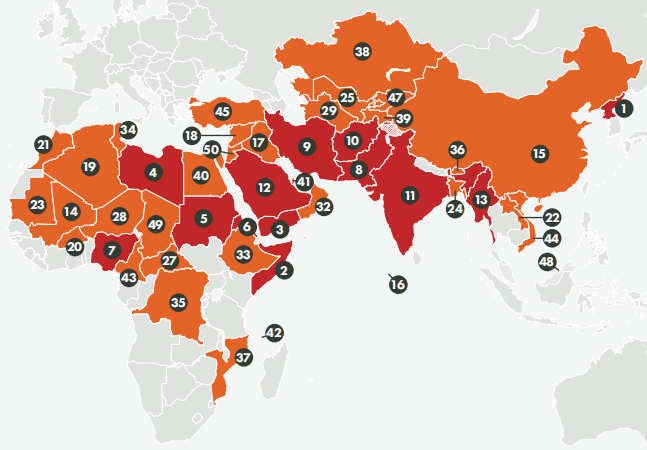Open Doors released its 2025 World Watch List (WWL) on Wednesday, revealing that over 380 million Christians worldwide face high levels of persecution and discrimination for their faith. The report highlights that two in five Christians in Asia experience persecution, with China ranking 15th on the list of the 50 countries where Christians face the most extreme persecution—a four-place rise compared to last year.
The WWL evaluates persecution across six categories: private life, family life, community life, national life, church life, and violence. Each category can score up to 16.7 points, with a maximum total score of 100. According to Open Doors, any country scoring above 40 is classified as experiencing "high levels of persecution." China's total score is 78, placing it in the "very high levels of persecution" category.
Among the categories, the scores for national life have increased particularly significantly over the last reporting periods, reflecting the ever-stronger pressure caused by authorities bringing everything and everybody into the framework of Communist ideology. The high scores for church life have consistently been in the "extreme" category throughout the five reporting periods, indicating how life for all churches has become much more difficult, regardless of their size or whether they are TSPM (state-approved) or unregistered house churches. Meanwhile, the scores for violence against Christians remain in the "very high" category; however, there have been no reports of Christians being killed for their faith.
The report outlines several ways in which persecution manifests in China. Unregistered churches, even those previously tolerated, are increasingly deemed illegal and subjected to pressure as authorities enforce tighter regulations and policies. State-approved churches face strong ideological controls, while smaller congregations are often forced to merge into larger, state-monitored entities. Additionally, children under 18 are prohibited from attending church. In regions where Islam or Tibetan Buddhism are the dominant religions, Christian converts encounter additional scrutiny and pressure, sometimes even violence, from their families and communities.
Converts from minority ethnic groups with Muslim or Buddhist backgrounds endure the most severe violations of religious freedom. They face dual pressures from state authorities and their families or communities, which can include acts of violence.
The WWL notes significant changes in China over the past year. Unregistered churches have been forcibly closed, compelling believers to take their fellowships underground. More house church leaders are being convicted of fraud or other economic crimes, leading to lengthy and grueling prison sentences. Registered churches are also restricted in the topics they can address in sermons.
Open Doors highlights that the relative openness Chinese churches once experienced is gradually diminishing. Each year, the expression of the Christian faith faces increasingly complex legal restrictions.
The organization estimates that China has 96.7 million Christians, with the primary sources of persecution identified as (post-)communist oppression and dictatorial paranoia. There has been a growing orthodoxy in Chinese ideology in recent years, emphasizing Communist values. The leadership's focus on maintaining power and social harmony has led to heightened control over all religions, including the Christian minority, as they are perceived as a strong social force.
North Korea continues to top the list, as believers will face death or "be deported to a labor camp and treated as a political criminal" if discovered by the authorities. The top 10 countries include Somalia, Yemen, Libya, Sudan, Eritrea, Nigeria, Pakistan, Iran, and Afghanistan.












